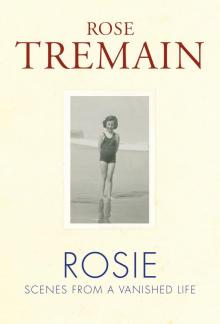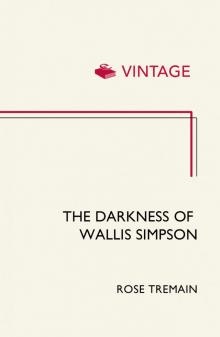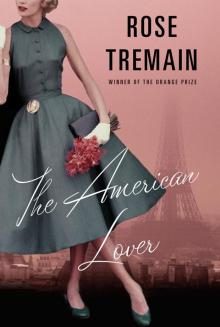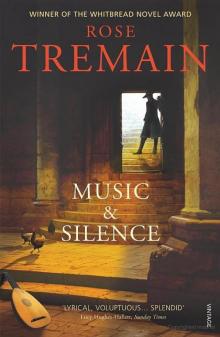- Home
- Rose Tremain
Sadler's Birthday Page 15
Sadler's Birthday Read online
Page 15
‘Come on, old thing. You didn’t let anybody down. I’d say you did what you could. We’ve been good to Tom. We’ve given him a home.’
‘Well, it can’t have been much of a home if he was so keen to leave it.’
‘Well, that’s only natural, I’d say.’
‘If it hadn’t been for Sadler, it wouldn’t have been a home at all.’
‘Sadler didn’t mind, did you Sadler? You and Tom got on like thieves, didn’t you?’
‘Oh yes, Sir.’
‘I’d say Sadler’s the one to worry about, Madge, eh Sadler? Bet you’re sorry to see the boy gone, what?’
‘Well I am, Sir, yes. We’ve had some good times.’
‘There, you see, Madge? Tom’ll be all right. He’ll learn a trade, I wouldn’t wonder. Clever with his hands. He’ll learn some kind of a trade.’
When Madge and the Colonel left the dining room, Sadler snuffed the candles and cleared the table. He felt tired but he didn’t want to go to his room. Sitting with Vera for an hour or two would be better than going there. He knew Tom despised him for being so sad because packing the boy’s suitcase with him, sorting and lovingly folding his things, he’d looked up to find him staring angrily at him.
‘Why can’t you put them in, Jack? They’re not the bleedin’ crown jewels!’
He’d sat down on the bed and held out a hand to Tom.
‘I’ll miss you, Tom.’
‘Well, yeah …’
‘You can’t imagine how much.’
‘I’d’ve hated it here if it hadn’t’ve been fer you.’
‘I love you.’
‘Well, yeah, in a way …’
‘In every way. I love you terribly.’
Tom turned away. ‘It’s no good, all this. I can’t spend my whole life like this!’
‘Why not? I could get another kind of job and rent a place for us. We could —’
‘Look, shut up, Jack. My Ma’s waiting. I’ll come back, won’t I, an’ see you? I always said I would. But I got to forget about all this an’ go home.’
Sadler had kissed Tom before letting him go. He had pressed the boy’s body against his own till he felt his resistance weaken a little and his mouth open. Parting from him then, wanting him and being given instead just the merest of smiles as Tom picked up his suitcase and left the room, gave him such pain that he stuffed his fist into his mouth to stop himself from screaming.
When Sadler went into the servants’ hall, Vera was sitting on the grey couch, comfortable there with her knitting and comforted, after an upsetting day, by the familiar movements her fingers made. Only when she was following a very difficult pattern did Vera look at her knitting; usually she stared straight ahead, seeming not to notice what her hands were doing. She looked up and smiled at Sadler as he came in.
‘Finished early in the dining room, didn’t they?’
‘Yes, I told you Mrs Bassett said she wasn’t hungry.’
‘Not my day, was it? Bleedin’ steak and kidney lunchtime …’
‘I’m sorry, Vera.’
‘Not your fault, Mr Sadler. Just that kind of a day. Never mind, eh?’
Sadler took his pipe from the mantelpiece and began to fill it. It wasn’t yet dark outside. The summer evening with its weight of scent hung there.
‘Getting out, aren’t they?’ said Vera.
‘What, Vera?’
‘Evenings. Getting out.’
‘Oh yes.’
‘Nice time to be at the seaside, I wouldn’t wonder. We went every year with my mum. End of May. We played battledore and shuttlecock on the sands. Whitsand Bay.’
‘You should go back there one year, Vera. Take an early holiday.’
‘Me? Oh lor no! Too old to paddle now.’
They both laughed. Sadler inhaled pipe smoke, thought how odd it was that Vera had a laugh twice her size. She stored up laughter, using it as she did so sparingly.
‘Bet ’e’d never been ter the sea, ’ad he?’
‘Tom?’
‘Yes.’
‘Only once, I think.’
‘Told you, did ’e, his Ma took ’im?’
‘No. I took him.’
Vera looked up at Sadler in surprise.
‘Remember the evening last summer when I got back too late to serve dinner?’
‘Do I!’
‘We got a bus to Cromer.’
‘You never said nothin’.’
‘Tom wouldn’t. He said he liked to keep things secret that he’d enjoyed. He said telling them spoiled them. We were late because the bus broke down. Tom enjoyed that more than Cromer.’
‘Oh lor!’
‘We all clambered out and sat on the verge, everyone grumbling. Tom found himself next to a fat woman with peeling shoulders and offered to pull the bits of skin off for her!’
‘Cheeky little sod!’
‘Oh she let him. Told him she couldn’t reach. So he peeled each piece off and gave it to her. She just laughed and wobbled!’
‘Well I never.’
‘But he did like the sea, in a way.’
‘The river was his favourite, wasn’t it?’
Sadler nodded. No. He couldn’t talk to Vera about that. He turned to look out of the window and Vera began counting her stitches.
‘Twenty-two, twenty-four, twenty-six, twenty-eight, thirty …’
Sadler relit his pipe.
‘Forty-four, forty-six, forty-eight, fifty, fifty-two. Well …’
‘What, Vera?’
‘Funny ter think ’e’ll be back in London now. Bet ’e feels as if none of it ever ’appened.’
VII
Sadler was stirring the stew Mrs Moore had made for him at the beginning of the week. The meat was boiled to shreds and it looked repulsive, like sick. I’ll give it to the dog, Sadler decided, but then he noticed that for what seemed like the first time in months, he was hungry.
He tried to imagine himself gobbling up the stew; sitting at the table with bowl and spoon, sloshing it down. What a sight! Hand so feeble it joggles the spoon, co-ordination gone, mouth gulps too soon and the boiled meat slides down the stubbly chin. But it would have to do. There was nothing else to eat – dog food and beans and bread, that was all. And the hunger was there, the first hunger for a long time. Or perhaps he had a worm to feed?
He sat down at the kitchen table and began to spoon up the stew. These days he’d listen to himself eating, hear the food going in, more than taste it. Funny that. Crunching biscuits deafened him. Senses all confused, of course; his body couldn’t distinguish any more. Normal enough at his age.
He looked at the dog stretched out by the Aga, its back feet ridiculously crossed. It was making no sound at all that he could hear, so he stopped eating to listen for its little sighs of breath. But still nothing. No audible sound whatsoever. Sadler stared at it. Surely dogs didn’t die with their legs crossed? He’d never watched a dog die. Perhaps, in their humility, they made no fuss at all, no final spasm or convulsion. Perhaps they always crossed their legs as a deception, so that their dying would give you no trouble. You’d just go to call them, those that had names, and the tails that always flickered with obedient delight in answer to your voice, would fail to move – and this your only clue.
‘Boy!’ Sadler used this term when it seemed necessary to call the dog something. ‘Boy!’
But he could see now, not see, feel, know that the dog was dead and panic began to seize him.
‘Dead, are you?’ he asked, hushed. ‘Are you?’
The dog jumped, tried to get to its feet and fell over with a frustrated whimper. Sadler laughed with relief. You’re going mad, old man, he told himself, fancy not being able to distinguish between life and death.
‘All right,’ he said to the dog, ‘you can lie down again. I was only testing.’
He didn’t love the dog. He didn’t even like it very much, and yet the relief he felt that it was still alive didn’t surprise him. With something like pleasure, he ate the res
t of the stew.
And then, he thought, with a full belly I might lose an hour, if I’m lucky, sleeping. The Colonel always had a nap after lunch, but not until quite recently had Sadler remembered this, remembered that the Colonel would fall asleep seconds after his meal was finished, sometimes nodding off in his chair as he was brought his coffee. Madge said she knew it was unkind of her, she knew her husband loved his little sleep, but she couldn’t help being irritated by it, day after day, that little bruise of irritation. It was, she seemed to feel, as if he was letting his body be rolled away down a steep hill. It was the loneliest moment of her day.
But there was no one left looking down if Sadler slept. He could snore all afternoon, wake up with the dark. But he had to choose. He couldn’t, like the Colonel, sleep away night as well as day.
He began to search for his pipe. He thought it was on top of the wireless, but it wasn’t. So he started to go round the kitchen looking for it, opening cupboard after cupboard, staring blankly at things he hadn’t used once since the day Madge and the Colonel died – silver and china and glass, all the paraphernalia of countless meals taken so graciously, so cleanly long ago in the dining room – then asking himself why he was looking there for something he used every day. He went back to his chair and sat down in disgust. ‘Batty old fart! Clean round the bend, you are.’
Then he remembered seeing something in one of the cupboards that had interested him: a key hanging on a cup hook. And now he fancied he knew with absolute certainty that this was the key to his old room. But finding the cupboard again was like playing Pelmanism. Stiffly, he got up and began opening cupboard doors. Then the bell rang.
Shuffle, shuffle to the front door, but just before getting there, guessing he’d see the vicar standing on the step, and stopping, halfway across the hall, and shaking his head. Not now. Not the vicar now.
He waited motionless and the bell rang again. He had the feeling of wanting to hide. What if the vicar just opened the door and saw him standing there? He backed away, through into the stone passage that led to the kitchen, relieved when the door shut on him. But then he heard a car start up and the dog began to bark, and he knew it couldn’t have been the Reverend Chapman because the Reverend Chapman always came on a bike and the dog never stirred himself for him. So out Sadler shuffled again, almost at a run this time, to crane out of the drawing room window. He saw a blue car, unrecognizable in its similarity to hundreds of other blue cars, disappearing down the drive, driven, he thought he could see, by a young man.
He cursed. The old foolish notion that his visitor might have been Tom had unaccountably returned. He believed it long enough to feel dejected, and yet it was daft really when, for all he knew, Tom might be dead. Because he’d written hadn’t he? All those years ago – the only love letter he’d ever written in the whole of his life – and not a word had ever answered it.
There’d been a day, just one in 1949, four years after Tom had gone back to his Ma in London, when the lad had borrowed a car – or stolen it – and come driving down, ‘just to see you, Jack, because it’s such a time isn’t it, since we met, and I wanted you to see me now. Grown up, eh? Got me own suits now.’
The blond hair darker, almost brown, but still very thick; the smile studiedly crooked – Tom in his prime. And hours the smart young man had spent sitting with Madge, eating chocolates by her fire, even lunching with her and the Colonel in the dining room while Sadler served them. After the meal Sadler had gone straight to his room, knowing that Tom would come up to him. But it was almost half-past-three before he came – another hour and Sadler would have to be downstairs serving tea.
Sadler sat by the window and Tom lounged on the bed, talked about this job he had, selling cameras in a department store, talked about his Ma, married now, he said, and still in love enough to set the whole house rattling twice a week, talked and talked while the clock ticked on and all Sadler could do was remember the boy he’d held in his arms. Just after four, Tom said he ought to be going. He got off the bed and bent over Sadler and kissed his mouth. Sadler knew it was an insubstantial kiss, a gesture made for the sake of something past and ended, and yet at the same time he knew that if Tom touched him, he’d plead with him, beg to hold him just once more, humiliate himself, cry even, for the sake of the merest few moments.
But: ‘No Jack, don’t be soft. You were nice to me an’ all that, and it was quite fun, what we did, wasn’t it? But I’m grown up now. I’m not a kid no more. And I don’t want all that pansy stuff. Pansies are creeps on the whole. Anyway, I fancy the other thing these days. It’s much better, I’m telling yer.’
Sadler turned away, stared down at the orchard.
‘Don’t get all huffed, Jacko. Look I got to go now, got to get the car back by tonight.’
Sadler nodded.
‘Come on, then, say ta-ta, won’t you?’
‘Bye, Tom.’
‘Say you’re glad I came.’
‘Yes.’
‘Cheers then. See you another time.’
That evening, Sadler began a letter to Tom. He asked him to change his mind. He ended it with a plea to let him spend his holiday with him, his two weeks of holiday, ‘in some beautiful place away from this house and the demands of my work’. But the letter was never answered. He wrote again, just a note this time, telling Tom he was making plans to go to the Lake District. He’d heard about this little pub, not expensive at all, where you could stay and get breakfast and an evening meal. He said he’d heard it was very beautiful, the Lake District, and suggested that Tom bring his sketching things. He planned to go at the beginning of July, but while he waited for Tom’s answer, Madge was taken ill.
She was bedridden for a month and Sadler’s holiday came and went and he spent it calming the restlessness that the illness seemed to create in the other servants. Betty and Jane, both married, only worked part time now; they didn’t belong any more and they were tired of Vera’s grousing. Vera, whose soul ever seemed to crave excursions into caverns of total gloom, chose to believe that Madge was dying.
‘Course, I blame the Colonel,’ she declared, ‘cherchez le homme, as they say. ’E’s never given ’er much love or nothing. Too wrapped up in himself.’
Over Madge’s tray, Vera’s thin, careful hands would hover for hours. With each meal she sent up, there’d be a flower in a tiny glass pot. But her heart, she said, wasn’t in cooking for the Colonel. He’d never appreciated her food anyway, because, she explained, ‘the army does that to you. Serve you up any old muck in the army. Ruin your palate.’
‘Not to officers, Vera,’ Sadler reminded her. ‘Don’t you remember Wren describing all those courses with different wines?’
‘Same old muck – just more of it and dressed up like Sunday, that’s all.’
So Vera decided the Colonel would eat what the servants ate. She was punishing him, she said, for ‘neglect of a loving soul’.
A specialist from London was sent for when what had appeared to be a gastric attack had left Madge abnormally weak. He told her that she’d had a mild heart attack, prescribed a period of complete rest. ‘Any exertions at all,’ he cautioned, ‘could cause another one that might be fatal.’
The idea that her heart was weak pitched Madge into a deep depression. She lay and studied her life. She lay and listened to the summer in her garden, thought how, in some people, those same sounds might have engendered thoughts of some significance, but in her nothing at all of any value, only a mild feeling of pleasure. She remembered summers when she was a girl, how hot weather had made her excited and that her mother had rebuked her for having red cheeks: ‘It’s so common, Margaret dear. Now go and lie down for half an hour. I want no one to see you like that.’
She’d imagined love then. She’d pictured herself decked out for love. She’d believed then, lying there as she lay now, that she could feel passion and that her adult life would be carried forward by passion. Supposing, then, there had been someone else, not Geoffrey, not the young
officer she’d chosen at twenty-six. Who had she met in all those years until her marriage? No one. She could remember the arm – the same one or hundreds of different ones? – going round her waist, the nights and nights of dancing, but she could never remember any faces, never any eyes, mouths, that she might have kissed.
The Colonel came and sat with her. He read to her, and when she felt stronger, after two or three weeks, they played Gin Rummy. She’d always enjoyed cards, could become absorbed in a game in minutes. But she was terribly forgetful, no good at Bridge any more. The only games she remembered nowadays were Gin Rummy and Patience.
Over the cards she watched her husband. She longed to ask him where and how often in the years they’d spent together he’d found any love. Whenever she pictured him making love to anyone, it was always in the Savoy. And this thought would make her laugh. But she never asked him, because she knew he would have felt obliged to lie. He would never have understood that she hoped for his sake he had been unfaithful to her. He’d been her faithful companion – that was all she had asked.
The presence she found she liked best, as she lay there with her thoughts, was Sadler’s. She’d tell him things. She told him that when she was eighteen, her father started to go mad. He began ferreting out ancient friends in London, and bringing them down to stay and offering Madge to them. ‘There’s my bond, there’s my bond,’ he’d intone, ‘I give you my daughter!’ The friends were embarrassed, couldn’t even look at her, dressed as he always made her dress, in white. Some of them were married and began mumbling that their wives wouldn’t like it and the old man would go into a rage which left him very weak and morbidly ashamed.
‘I suppose,’ Madge said, ‘I must have been frightened of him. I know my mother was, but she was frightened of rose petals – she said they gave her asthma. I don’t remember being frightened, only sorry. Someone had once told me that they shot dogs if they went mad, and I was afraid someone would shoot my father. He knew he was losing his grip on things, you see. He kept going to London to see more and more doctors. I went with him on one of the trips and in the train he took my hand and said he was sorry about offering me to his friends, he’d only meant it as a joke, as a sign of his affection. “But everything’s got out of hand lately, Margaret,” he said, “I don’t want your mother to know, but I can’t seem to get things straight any more.” But I let him down, Sadler. He wanted me to be strong and help him and I cried. I cried in the train and he hit me to make me stop and there was a terrible rumpus in the carriage. He hardly spoke to me after that, hardly seemed to see me even.’

 Rosie
Rosie The Garden of the Villa Mollini
The Garden of the Villa Mollini Merivel: A Man of His Time
Merivel: A Man of His Time The Darkness of Wallis Simpson
The Darkness of Wallis Simpson Earth
Earth Sacred Country
Sacred Country The Swimming Pool Season
The Swimming Pool Season The Gustav Sonata
The Gustav Sonata Sadler's Birthday
Sadler's Birthday The Cupboard
The Cupboard The American Lover
The American Lover Letter to Sister Benedicta
Letter to Sister Benedicta Evangelista's Fan
Evangelista's Fan Restoration
Restoration The Road Home
The Road Home The Colonel's Daughter
The Colonel's Daughter The Way I Found Her
The Way I Found Her Music & Silence
Music & Silence